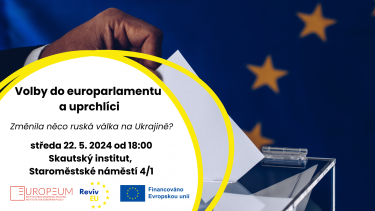RevivEU | Did the Russian war in Ukraine change anything?
We invite you to a public podcast recording focusing on the discussion of changes in the Czech approach to refugees due to the Russian war in Ukraine. We will delve into shifts in Czech solidarity towards refugees and also discuss the new migration pact, its content, and significance.
Show moreiDnes.cz | What exactly is in the migration pact
The European Union has approved a migration pact, and from 2026 individual states will either accept their share of refugees or pay to opt out of this obligation. However, since the Czech Republic has already accepted a large number of refugees since the outbreak of the war in Ukraine, it should temporarily be exempt from this obligation. However, as noted by Viktor Daněk, deputy director of the Institute for European Policy EUROPEUM, this is not an exemption explicitly granted to Czechia. Exemptions are determined based on the number of people granted asylum or similar protection in a given country.
Show moreCNN Prima News | European migration pact: does the Czech Republic have an exemption or not?
The Chamber of Deputies discussed the EU Migration Pact for over three hours. The opposition criticises the pact and claims that it indirectly introduces quotas. At the same time, there is uncertainty about the interpretation of a possible exemption. What does the pact stipulate and what impact could it have on the Czech Republic? Viktor Daněk, deputy director of the EUROPEUM Institute for European Policy, commented for Partie Plus on CNN Prima News.
Show moreČRo Plus | What will the new EU migration rules commit the Czech Republic to?
After many years of unsuccessful efforts, EU member states and MEPs agreed today on new migration and asylum rules for the European bloc. The series of standards provides for, among other things, more effective checks on migrants and faster return of failed asylum seekers to their countries of origin. It also introduces compulsory solidarity among all EU states, which can help overburdened countries either by accepting part of the migrants or by providing financial or material aid. Our deputy director Viktor Daněk commented on the topic for Radiožurnál.
Show moreBLOG | The case of Lampedusa: A humanitarian crisis in the midst of a dilemma between EU solidarity and states’ sovereignty
In September 2023, Lampedusa, a small Italian island, faced an unprecedented surge in arrivals, sparking a heated debate within the EU. With conflicting perspectives from leaders like Ursula Von der Leyen, the focus has shifted from humanitarian aid to security concerns. This blog written by Nicolas Rouillard explores the complexities of the crisis, the divergent opinions, and the critical decisions ahead that could reshape Europe's approach to migration.
Show moreČRo Radiožurnál | How can EU interior ministers adjust the rules for returning failed asylum seekers?
The attack on two football fans in Belgium has exposed the inefficiencies and flaws in Belgium's migration policy. How can EU interior ministers adjust the rules on returning failed asylum seekers? Our deputy director, Viktor Daněk, commented on the topic in the Odpolední publicistika programme.
Show moreRadiožurnál | Union migration reform
Our new deputy director, Viktor Daněk, commented on the newly published draft of the EU migration reform which was approved during the foreign ministers' summit in Spain.
Show morePOLICY PAPER | The New Pact on Migration and Asylum and the war in Ukraine: time for a paradigm shift?
Christian Kvorning Lassen, deputy director and head of research at the EUROPEUM, writes in his policy paper about the new pact on migration and asylum. In his article, he reminds that migration remains highly politicized.
Show moreWork in Progress: The Migration Pact between French and Czech presidencies
Egmont Royal Institute for International Relations, EUROPEUM Institute for European Policy and Think Visegrad platform cordially invite you to an expert roundtable discussion titled: Work in Progress: The Migration Pact between French and Czech presidencies.The discussion will take place on Tuesday 12th July from 17:00 to 19:00 at the Orange Room of the Egmont Palace, Place du Petit Sablon, 8, 1000 Brussels
Show more PDF
INVITATION: Asylum and migration policy: Danish and Czech perspectives
On behalf of EUROPEUM Institute for European Policy we would like to cordially invite you to a discussion titled ''Asylum and migration policy: Danish and Czech perspectives''. The event is organized in cooperation with the Embassy of Denmark in Prague. The discussion will take place on Thursday, April 21, 2022 from 16:00 at the European House (Jungmannova 745/24, 110 00) and it will be also live-streamed on our Facebook page.
Show more
Staroměstské náměstí 4/1
Prague 1 - Staré Město
110 00
tel.: +420 212 246 552
email: europeum@europeum.org
https://www.europeum.org









